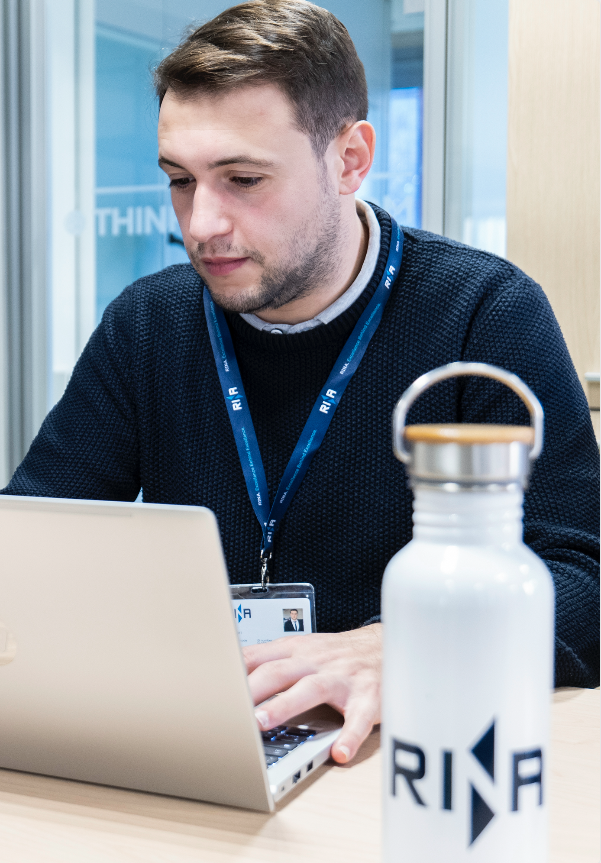



We successfully met and overcome our contribution margin targets for
the year, whilst top-line results were in line with expectations. This outcome
demonstrates our ability to manage operational efficiencies and reflects our
resilience in achieving financial goals even when faced with revenue
shortfalls.
An important aspect of our operations includes engaging with all
subsidiaries and ensuring compliance with client confidentiality and
permissions. This collaborative approach ensures that the entire organization's
insights and capabilities contribute to the overarching goals and comply with
legal and ethical standards.
Geographically, the Gulf and Middle East regions emerged from a
period of investment stagnation, presenting new opportunities particularly in
the rail and infrastructure sectors. This shift resulted in a substantial
volume of proposals and tenders, which gives us a very positive outlook for the
next few years. In contrast, the markets in Italy and Europe also showed robust
activity, bolstered by the ongoing investments from recovery funds. However,
resource constraints posed challenges, affecting the pace of project
executions.
Significant achievements included securing a major framework
agreement with the Italian Railways, which will support the design verification
for new signalling systems. This contract is pivotal as it ensures our
involvement in enhancing Italy’s railway infrastructure.
In the U.S., we solidified our presence through the acquisition of a
contract for the Red Line extension in Chicago. This expansion is aligned with
our strategic goals and enhances our ability to engage in high-value projects
across significant geographical markets.
The business unit continued to push the boundaries of innovation within the infrastructure sector. A significant project called the "Digital Construction Worksite" was launched, integrating IoT technologies, optimisation techniques, and collaborative working environments. This initiative helps manage complex construction sites more efficiently by using a digital dashboard to anticipate potential disruptions, thereby improving workflow, and enhancing safety.
Another notable innovation was the development of the "Digital
Resilience Platform," a valuable tool that is the result of a long-term
strategy as a pioneer in Resilience Engineering. The platform supports
infrastructure managers in enhancing the resilience of assets against natural
and climate change events. It provides data-driven decision support for
investment planning and operation management, which is crucial in the face of
increasing climatic uncertainties.
The Digital Resilience Platform is an entire digitalised ecosystem,
providing full data analytics and customer-specific dashboard views of
customers’ assets. We will continue to develop this platform to make sure we
adapt to the complexity of future landscapes for the industry. For example, we
are already adding a “Climate Resilience Maturity Assessment” (CREMA) module
within the platform to provide future climate impact scenarios, that could
impact urban environments and assets. This will support municipalities, urban
agencies, and public entities, in their investments planning and
decision-making process, to mitigate the effects of climate change and to adapt
to them in the long-term, by comparing different scenarios to a baseline of
taking no action.
Our focus on innovation also included adaptive strategies in project
management and service delivery. We refined our commercial approaches and
leveraged new technologies to improve efficiency and project outcomes. The
development and implementation of advanced digital tools, particularly in
infrastructure monitoring, positioned us as a leader in technological
adaptation within the industry.
contracts worked during
the year

square meters of buildings & urban development design

million revs in project management/owner engineering activities
Our efforts toward decarbonization were highlighted through work on the European Union's ambitious goals to transition public transport to cleaner energy sources. RINA undertook a pivotal study analysing the energy transition in the local public transport sector in Italy, aiming to reduce the carbon footprint and support the EU's climate neutrality goals by 2050.

Enhancing Dublin's
Rail Network with Battery Electric Multiple Units (BEMUs)
Initiated in June 2023 and set to conclude in April 2026, Iarnród
Éireann, supported by the NTA, will be purchasing BEMUs ahead of the DART+
Coastal North project's completion. DART+ Coastal North will increase the
frequency and capacity of train services between Drogheda and Dublin City
Centre with high-capacity DART trains. The trains will replace diesel rolling
stock, reducing carbon footprint, and the enhanced train service will provide
an attractive alternative to car travel.
The BEMU project, which includes substation and charging roads,
depot modifications, and stabling road modifications, aims to provide enhanced
services on the network before full electrification. RINA experts in railway
and infrastructure design, HSE, operational safety, project and risk
management, and human factors design are supporting the project. This is the
first detailed design project in Ireland developed entirely by RINA in Ireland,
showcasing its expertise in railway systems and infrastructure design.
Advancing Italy's
Rail Signalling System
Running from September 2023, this ongoing project supports Italferr
in verifying the Executive/Constructive Design for the ERTMS/ETCS Level 2
upgrade of railway lines under Italy's National Recovery and Resilience Plan.
It encompasses various disciplines, including a new signalling system, ensuring
design completeness, legislative compliance, and technical and economic
feasibility. The project represents digital innovation in railway control,
highlighting RINA's commitment to industry compliance and reputation. It
enhances the operational efficiency of the railway network and marks a
significant step in modernizing Italy's railway infrastructure.
Promoting Sustainable Urban Mobility in Rome
The Technical and Economic Feasibility of Viale Palmiro Togliatti
Tramway project, conducted from April to July 2023, focused on designing a new
tramway in Rome. The 8 km tramway connects Ponte Mammolo and Subaugusta metro
stations, intersecting with Centocelle metro and FL2 regional railway. Adhering
to the UNI 8379:2000 standard, it mostly follows a reserved route for the
exclusive use of captive-driven vehicles. This project is a key part of Rome's
sustainable urban mobility plan, aiming to improve access to services, safety, the
efficiency of transport of people and goods, and environmental quality while
reducing air and noise pollution. Managed by RINA to in line with urban
sustainability goals, the tramway will ease congestion at major junctions and
connect vital districts, benefiting the city's infrastructure and residents.
More information is available at
Roma Mobilità's website
.
Enhancing Energy
Efficiency in Railway Operations
The Energy Audit of Railway Rolling Stock for Tunisian Railways
(SNCFT), which ran from November 2021 to December 2023, was a project aimed at
enhancing energy efficiency in railway operations. In collaboration with the
European Bank for Reconstruction and Development (EBRD), RINA provided
technical assistance to SNCFT for conducting an energy efficiency audit. This
comprehensive audit included analysing energy consumption, evaluating
technological and organizational solutions, and drafting an action plan to
reduce energy consumption. The project's primary goal was to assess the energy
performance of railway rolling stock and propose an investment plan to minimize
energy usage and environmental impact, considering factors like air pollution,
infrastructure impact, and CO2 emissions. RINA's role involved an in-depth
analysis of energy consumption drivers, review of technical solutions and
institutional best practices, developing an action plan, and training SNCFT
personnel on recommended energy reduction measures. The project provided
significant benefits to SNCFT, including potential improvements in energy
efficiency of its rolling stock and company in general, which would provide
substantial energy savings.
Facilitating Urban Transport in a Congested City
The Feasibility Study and Detailed Project Report (DPR) for
constructing a new 37 km metro line in Bangalore, India, was a significant
project undertaken from September 2022, with the DPR ongoing. This project,
part of the Bengaluru Comprehensive Mobility Plan 2020, extends the metro rail
corridor from Dommasandra Circle (Sarjapur Road) to Sarjapur village,
incorporating 29 stations. The project's scope involved developing the DPR,
beginning with a review of the existing feasibility study. It addressed challenges
such as selecting the alignment and station locations, which, based on previous
studies and stakeholder suggestions, required extensive revision for final
approval. This metro line is notable for being the longest studied by RINA and
presents technical challenges that demonstrate RINA's capacity for optimizing
solutions.
The project is crucial for Bangalore's urban development, aiming to
reduce private car usage, decrease pollutant emissions, and improve
environmental conditions. Executed by the Indian RINA team, it involved diverse
expertise in transportation, alignment, rail systems, and economic and
environmental analysis. For RINA, this project underscores their ability to
conduct feasibility studies and preliminary designs for major international
metro lines. The completion of the DPR marks a significant step towards realizing
the metro line, with the alignment and station locations reflecting extensive
stakeholder engagement, a critical aspect of the project's lifecycle.
Implementing Intelligent Transportation System in Chandigarh, India
The PMC IT Sfor CTU CHD project, running from January 2023 to
December 2028, is a part of the Efficient and Sustainable City Bus Services
initiative by the Government of India. It focuses on improving bus transport
infrastructure, fleet management, and introducing Intelligent Transport Systems
(ITS). Four cities have been selected by the Ministry of Urban Development to
demonstrate a modern and sustainable city bus service: Bhopal, Chandigarh,
Jaipur and Mira Bhayandar. RINA is providing PMC services for ITS implementation
including Automatic Vehicle Location (AVL), systems to increase productivity
and reliability, fleet management aimed at reducing operational costs, and
Passenger Information Systems (PIS) to improve customer experience in
Chandigarh. The project will increase public transport efficiency and
environmental sustainability and highlights RINA’s expertise in Intelligent
Transportation Systems.
Integrating New Metro Lines with Existing Infrastructure
Starting in January 2023, this ongoing project includes extending an existing metro line and integrating it with
another line at City Hall station. RINA is providing engineering services for
the design interface and integration management. Its role involves coordinating
project activities, managing technical and design risks, and ensuring seamless
operation with existing lines. The project is notable for its unique design
solutions and requires high coordination levels due to its complexity and
multiple stakeholders. involves providing engineering
services for design interface and integration management. It emphasizes RINA's
capability in handling complex railway/metro projects and marks its first
project in Canada.
Bridging Europe and Asia with a Rail Connection
From January 2013 to December 2025, RINA is involved in providing
system engineering services for the 76.6 km-long Marmaray Railway Line in
Istanbul, Turkey. This line, including underground and surface stations,
connects Europe and Asia under the Bosphorus Strait. The project addresses
challenges like managing line extensions without service interruption and
careful excavation due to historical ruins and is anticipated to have a
positive impact on the environment and sustainability by promoting mass transit
and potentially reducing reliance on individual vehicles. It is a pioneering
project in railway and systems engineering, enhancing Istanbul's connectivity
and representing a significant technical achievement in infrastructure. The
project is a testament to RINA's global reach and expertise in large-scale
transportation services.
Pioneering Hydrogen Infrastructure in Milan
From January to April 2023, RINA conducted a feasibility study for a
renewable hydrogen refuelling station mainly dedicated to the supply of
hydrogen to heavy vehicles reaching the Milan Malpensa Cargo City airport. The
project aligns with the European OLGA project, aiming to produce hydrogen
through electrolysis. The study involved analysing the hydrogen supply chain,
evaluating technical options, financial sustainability, and designing the
refuelling station layout. This project highlights RINA's capabilities in
innovative transport engineering, experience and expertise in hydrogen, and
commitment to environmental sustainability.
Optimizing Procurement Processes in Rail Operations
Between April 2022 and September 2023, RINA provided technical
support for Israel Railways' spare parts management. The project focused on
diversifying procurement sources to optimize costs and manage equipment
obsolescence. RINA's expertise in industrial markets was crucial in developing
recommendations for improving the spare parts procurement process.
Enhancing Rail Infrastructure in Latvia
From September 2023 to January 2024, RINA was involved in the master
planning and value engineering of a rolling stock maintenance facility in
Jaunmārupe, Latvia. The project aimed to optimize the facility layout for
functionality and phased development. RINA's expertise in transport engineering
and layout design played a key role in supporting the client with optimal
choices for the project's implementation. The project underscores RINA's
international presence in railway consulting and infrastructure development.
Advancing Sustainable Rail Transport in Italy
In early 2023, RINA conducted a concept study for a railway hydrogen
refuelling station in Puglia, Italy. The study aimed to assess the technical
and economic viability of using hydrogen-powered trains and building a
refuelling station. This project is among the first of its kind in Europe and
supports the region's growth in renewable energy production. It positions RINA
at the forefront of sustainable railway solutions and hydrogen technology.
Innovating Urban Logistics in the EU
From September 2020 to September 2024, RINA is part of the EU-funded
Smart Network Operator Platform enabling Shared, Integrated and more
Sustainable Urban Freight Logistics (SENATOR) project, aiming to produce
governance schemes on user demand planning, transport planning, freight and
logistics planning, and city infrastructure. SENATOR delivers an innovative
“control tower” approach, allowing dynamic planning and ensuring operative
optimisation through a fluent relationship between urban planners, urban freight
logistics players and citizen engagement.
RINA developed Sustainable Urban Logistic Plan (SULP) Guidelines, to
produce a complete set of governances for urban planning which integrate
freight, logistics and citizen mobility.
The project implements Sustainable Urban Transport Planning, which
is a strategic and integrated approach primarily aimed at improving
accessibility and quality of life by making a shift toward more sustainable
mobility. Urban mobility together with urban logistics are key elements for the
development of cities and contribute to improving economic performance,
increasing efficiency, improving air quality by reducing CO2 and pollutant
emissions, and improving road safety for all. The project highlights RINA's expertise
in sustainable transport engineering and urban planning.
Mobilizing Sustainable Energy Projects in EU Islands
Running from October 2019 to February 2024, the NESOI project focuses
on mobilizing investment in sustainable energy projects on EU islands. RINA
leads the work package for selecting islands to receive support and provides
technical assistance for over 20 projects. NESOI supports projects at different
stages of development, starting from early-stage, where a high-level technical
& economic assistance is required, to more advanced ones that are asking
for specific and detailed contributions in specific areas. In this context,
RINA has had the possibility to develop specific methodologies and approaches
to support Local Communities in fostering energy transition and deploy
e-mobility. The project promotes energy transition and sustainable development
in island communities and RINA's involvement demonstrates its expertise in
energy engineering and renewable energy solutions.
Improving sustainability, safety, and usability of highways in Italy
through Digital Transformation
Starting in January 2023, RINA is involved in the development of the
A24-A25 Smart Road Highway in Italy. At 281.4 km and as one of the few roads
connecting east-west Italy, the A24-A25 highways are one of the main strategic Italian
infrastructures. This project includes seismic retrofitting and the
installation of smart road systems for improved safety and sustainability in
difficult, mountainous terrains. RINA's role encompasses sustainable transport
engineering and digital transformation, making the highway a model of
technological and environmental innovation.
Enhancing Healthcare Infrastructure in Italy
From September 2023 to August 2026, RINA is providing
PMC/construction supervision and safety coordination for the demolition of two
buildings and construction of a new one within an operating hospital for the
new Giannina Gaslini Hospital in Genova. The project uses BIM methodology for
project management and construction supervision. The building has been equipped
and designed with modern, integrated technological features to achieve zero CO2
impact, reduce the fragmentation of services between several buildings, achieve
better and greater accessibility and usability, contribute to territorial
development by integrating complementary services and logistics, enhance green
areas and requalify existing building stock and services. The project
highlights RINA’s expertise in managing complex healthcare infrastructure
developments.
Balancing Cultural Preservation and Modern Engineering
Starting in September 2023, RINA is involved in the functional and
energy redevelopment of the Regione Lazio headquarters in Rome, one of the most
iconic and distinctive buildings within the Lazio Region headquarters. The
project addresses energy efficiency in both systems and the building envelope,
fire safety, and structural stability and meets challenges such as executing
redevelopment work without evacuating the building and adhering to sustainable
design guidelines. A significant aspect of this project is to compare the
applicability of current regulatory requirements on energy efficiency with
those of a building constructed in the 1960s, which adhered to an entirely
different regulatory landscape. RINA's expertise in various engineering
disciplines is crucial for this culturally significant project and the work
emphasises RINA's ability to handle complex architectural and engineering
challenges.
Creating a Prestigious Maritime Destination in Italy
From March 2022 to March 2024, RINA is playing a key role in the
development of the Fiumicino Isola Sacra Port in Italy. The project involves
creating a greenfield port with leisure boat and cruise ship facilities,
focusing on net carbon strategies, energy self-sufficiency and social
sustainability. RINA's multidisciplinary team supports the client in design,
engineering, and environmental impact studies.
Thanks to the introduction of the cruise function, the project is
expected to generate significant induced activity in the entire area: tourist
development, supply of local products, involvement of various local players,
protection and promotion of cultural heritage and international visibility. The
analysis of the socio-economic impacts has estimated 0.9 yearly and 1.4 overall
billion euros economic impact in the operational and construction phases
respectively. Job growth is expected to range from close to 8,500 jobs in the
construction phase to more than 5,000 jobs per year in the operational
phase.
Establishing a Modern Cruise Port in Italy
Since May 2022, RINA has been involved in the Ravenna Cruise
Terminal project in Italy. The project focuses on constructing an
energy-efficient cruise terminal with LEED Gold certification. The project is
the first Cruise Terminal project, under a PPP scheme, delivered by the
Ports&Marine facilities team to start the construction phase. RINA's
multidisciplinary team is responsible for project management, design, and
environmental sustainability aspects.
Coordinating Urban Improvements for a Major Event
From November 2023 to December 2024, RINA is managing a range of
infrastructure and service improvements for the Jubilee 2025 in Rome. The
project aims to enhance public transport, revamp existing areas, and promote
sustainable mobility. Timescale is crucial and the project requires
coordination of many different stakeholders. The work needs to minimise
disruption to the city, while promoting environmentally sustainable solutions. RINA's
expertise in project and program management is key to achieving these goals.
Coordinating Urban Improvements for a Major Event
From November 2023 to December 2024, RINA is managing a range of
infrastructure and service improvements for the Jubilee 2025 in Rome. The
project aims to enhance public transport, revamp existing areas, and promote
sustainable mobility. Timescale is crucial and the project requires
coordination of many different stakeholders. The work needs to minimise
disruption to the city, while promoting environmentally sustainable solutions. RINA's
expertise in project and program management is key to achieving these goals.
Improving Regional Connectivity in Italy
Starting in July 2022, this ongoing project focuses on designing a
new highway link to enhance access to the Fontanabuona valley. The project
focuses on sustainability, minimizing impact, and optimizing design using BIM
and 3D technology. The total length of the new connection is about 10 km and it
includes two natural tunnels, 8 viaducts/bridges, an overpass above the
existing A12, a new artificial tunnel and different earth retaining walls. The
complexity related to the site, to the interference with the existing highway
system and the surrounding urban areas required a high level of integration and
project coordination between the various disciplines. RINA's expertise in road,
geotechnical, and bridge design is crucial, and its involvement highlights its
expertise in road design and geotechnical engineering, contributing to regional
development and accessibility.
Enhancing Road Safety and Viability
From June 2022 to July 2023, RINA undertook a project to optimize
the technical solutions for the S.S. 639 road in Lecco. This project entails
optimizing the road layout and technical solutions for a tunnel construction,
considering alternative routes and excavation methodologies. RINA's role
includes addressing the project's complexities, such as geological,
hydrogeologic, and structural challenges, and ensuring safety, timing, and cost
reliability. The project is innovative in its approach to tunnel design and
construction, with a focus on minimizing environmental impact and ensuring
sustainability and demonstrates RINA's capability in addressing complex road
construction challenges and ensuring safety and reliability in infrastructure.
Designing a Strategic Diplomatic Facility
Commencing in September 2022, RINA is designing a new compound for
the Italian Embassy in Nairobi, Kenya. Located in the Muthaiga district, the
project involves creating a secure, usable, and environmentally sustainable
compound with minimal impact on the naturalistic context. RINA's
multidisciplinary team is addressing challenges related to security,
sustainability, and the complex geographical location, using BIM methodologies
and 3D digital models for project integration and support. It has designed the compound
and buildings not only to the highest quality standards but also prioritising
the selection of materials locally available and the technologies mostly used
in the country. RINA's role in this project underscores its architectural and
engineering expertise in creating secure, sustainable, and culturally sensitive
diplomatic facilities.
Addressing Navigational Hazards in the Danube
Scheduled from January 2024 to January 2029, this project aims to
remove sunken World War II vessels from the Danube River near Prahovo. This is
the most hazardous section for navigation, and only a part of the Danube water
area in this stretch is located on Serbian territory. The width of the water table in the project
area between the riverbank and state border between Serbia and Romania amounts
to 200-300 m. RINA is providing supervision, administrative, financial, and
environmental oversight for the removal of these hazardous shipwrecks, which
hinder navigation. The project is unique due to its historical context and the
presence of unexploded ordnance (UXOs), requiring a combination of local and
international expertise for successful execution. The existence of about 600
potential UXOs in the close vicinity were identified, representing a major risk
and obstacle for removal of the vessels. RINA will provide supervision services
as well as administrative, financial and environmental overseeing of the works
for this complex and historically significant project.
